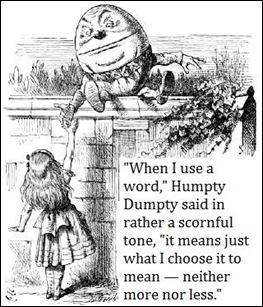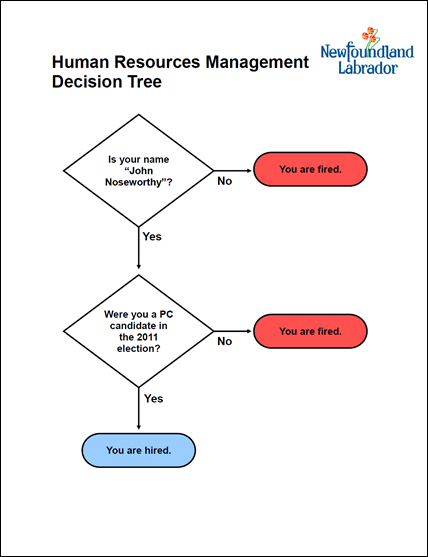With a couple of discussions about the media and how it covers news, no regular readers of the various scribbles in this province would be surprised to find a column on the same subject from the Telegram’s Peter Jackson.
Go read it. While you may disagree with Peter from time to time – and sometimes the disagreement is more often than not – Peter brings his considerable experience in newsrooms and that always adds to the discussion.
Right at the start, Peter very accurately describes what the basic problem is for people who toil thanklessly in newsrooms: too much stuff to fit into the available time and space. There’s no sarcasm in that, by the way. They work very hard, no matter what some people think. As a rule, they are trying to get the story right. They want to be fair and they want to do what they think is appropriate in addition to meeting the business demands of making money so everyone keeps his or her job.
That said, Peter couldn’t resist tossing some straw into his mix:
The media, say critics, were duped by the Tories into covering their little distraction at the expense of more important news.
Yeah, well, umm, no.
At least, not from this critic.
They weren’t duped by anything. The way the local newsrooms covered the Bennett story is a function of the way they tend to handle local political stories, especially in the post-2003 era.
Let’s take a look at what Peter says. He deploys the stock argument about fairness and all that, plus the bit about not “editorialising” that very often crops up in discussions about how stories get covered.
Whether it was a distraction is beside the point. It’s news. In fact, the smoke screen angle is itself part of the story. The reporter can’t conclude as such without editorializing, but the people he quoted certainly can — and did.
The primary goal in all cases is fair and accurate reporting. Keeping a cool head. Otherwise, exuberance can lead some journalists to completely cross the line.
That basically gets us beyond Geoff Meeker’s point about whether or not to cover the story in the first place. Your humble e-scribbler’s with Peter on this one: the story is news.
But now you get to a question that lives just an inch below that first one: what is the story?
All the bits that Peter Jackson recites – the call, the message, the kangaroo court in the House, the delay in raising the issue, Burke’s claim of being shaken, stirred or whatever – are all elements of the story. One you get beyond the choice to run the story, you have to figure out what the story is.
News stories tend to follow a pattern. The Big Idea, the thing they want you to remember, goes right up front. Then you run down through the next most important thing until you get to the end. That last paragraph is the stuff that first the reporter and then the editor have decided is expendable. It might actually wind up being tossed between the newsroom and layout, incidentally, but that’s another story.
The organization of the information in a good news story was always designed to engage the reader’s attention and inform him or her. You could read the first bit and get the key information. That imperative is even more important these days: people don’t read stuff any more. They skim. So it’s a bit of a challenge to get a lot of them to last past three or four sentences. Forget three or four whole paragraphs.
So in this one, would you consider the fact that Jerome made an accusation qualified as the top thing? Pretty much yeah. You can encapsulate the main details of the accusation in one sentence. Try something like:
In the House of Assembly today, the Progressive Conservatives accused Liberal MHA Jim Bennett of trying to intimidate Advanced Education and Skills Minister Joan Burke on February 3.
House leader Jerome Kennedy may have been the person who actually made the accusation. But no one should be foolish enough to believe that Jerome and Kathy and Joan and all the rest of the caucus didn’t have their talking points sorted out in advance. Your humble e-scribbler would run with the collective attribution for the accusation.
Besides, a news outlet has a obligation to fill in the gaps in knowledge so that people can situate a story in context. That isn’t editorialising. It’s informing readers.
Second sentence or paragraph? Maybe what Bennett actually said along with the context:
Bennett called Burke’s office in early February because he was trying to get help for a constituent who needed transportation from the St. Barbe area to Corner Brook for chemotherapy treatment.
Frustrated that he wasn’t getting results from Burke’s staff, he left a message on a Friday saying if the issue wasn’t settled by Monday, he would call “Open Line,” and “there will be hell to pay.”
Bennett also said, “I will absolutely trash your minister and say what a bunch of idiots she’s got working in her department. You fix the problem and fix it today or there will be lots of trouble.”
That’s from the Telegram story on March 9, incidentally. The structure we just used is essentially a variation on the “he said, she said” format some people like. You’ve given all the necessary details of what the whole thing was about.
Interestingly, though, that information about what Bennett said and why (according to him) is paragraphs four, five and six of the Telly story.
Here’s what they thought was more important. The accusation was the second thing. First was the sexed up version of the basic story as the Tories framed it:
Liberal MHA Jim Bennett was in the hot seat Thursday, after he was accused of threatening a government minister.
And before you got to what Bennett said, the Telly wanted you to know that the Premier thought it was ““absolutely appalling” and that the opposition House leader thought the Tories were grandstanding.
Now you don’t have to be a dupe or a partisan to write the Telly version of the story. You’d goose the story so that the drama – as forced as it was – might draw readers in. This could be what Peter referred to at one point: “making grey stories a little more colourful, is integral to the business of journalism.”
All legitimate points – journalism is a business as much as we might like it to be otherwise.
All news outlets get to decide a bunch of things about a story. They get to decide whether or not to cover something at all. And when they run a story, they get to decide what to do with it. The people who put news together have lots of choices and they face lots of pressures.
There were plenty of ways the local media could have tackled the Bennett story. The Telegram did it one way. They could have put a lot more information – facts – into their story at the front end that would have given readers a very different impression than what someone would have gotten if they didn’t make it beyond the third paragraph of the Bennett story.
Just think about it: in the Telly version, you could have gotten three paragraphs in without knowing what Bennett said. That information is important if you want people to be able to follow the simple formula: “We report, you decide.”
Without it, you get to decide, but you could decide wrongly.
It all depends on the frame.
It all depends on what someone decided to tell you about a particular story.
– srbp -








